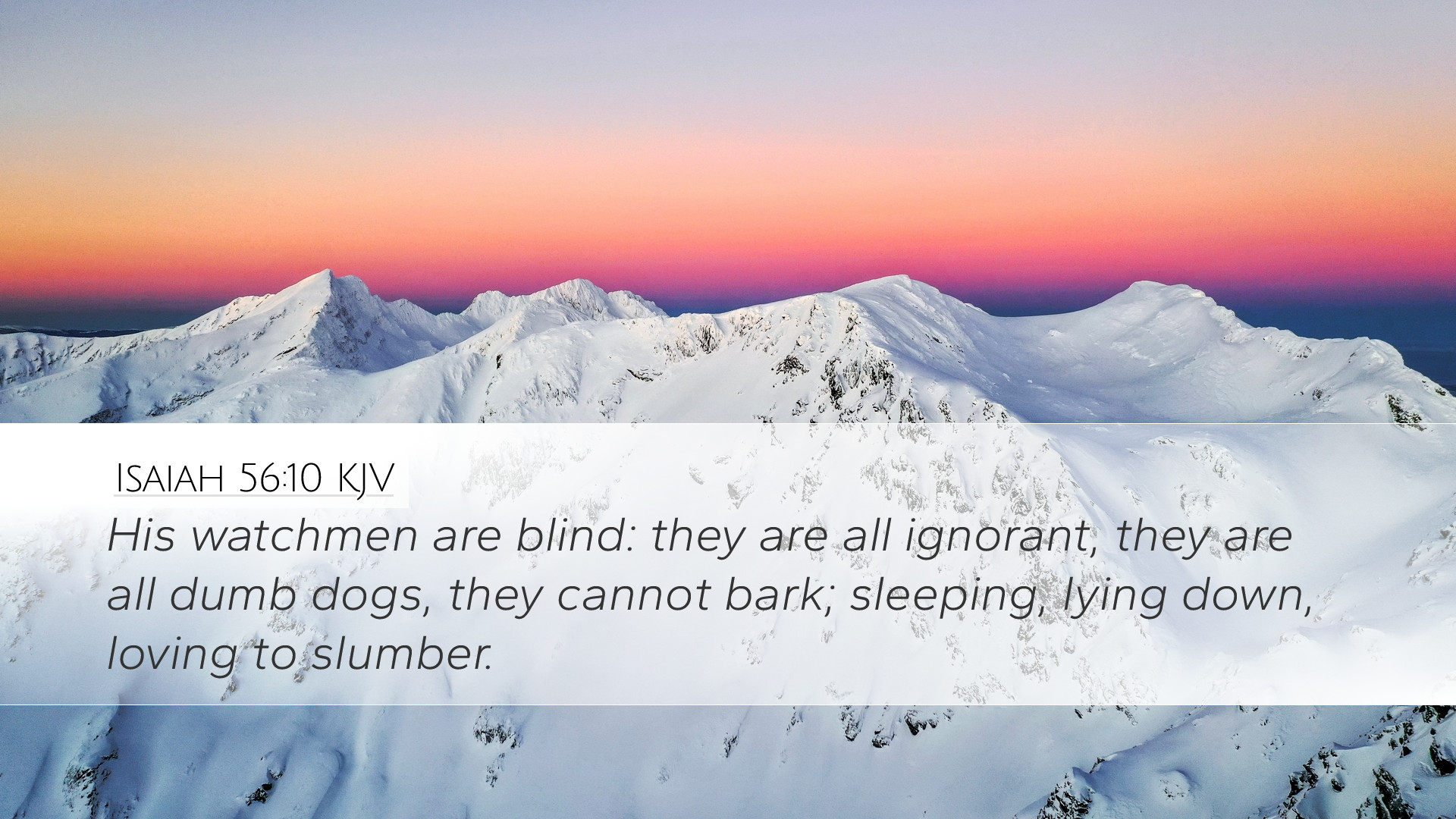Commentary on Isaiah 56:10
Verse: "His watchmen are blind: they are all ignorant; they are all dumb dogs, they cannot bark; sleeping, lying down, loving to slumber."
Introduction
The prophetic text of Isaiah 56:10 serves as a pointed criticism of the leaders of God's people during Isaiah's time. This verse reflects profound insights into the failures of spiritual leadership, particularly regarding their inability to discern and address the spiritual needs and dangers facing God's people. In combining commentary insights from Matthew Henry, Albert Barnes, and Adam Clarke, we aim to explore the depth of this criticism and its ongoing relevance.
Analysis of Key Phrases
-
“His watchmen are blind”:
Henry emphasizes the role of watchmen as those tasked with vigilance, guiding and protecting the people of God. In this verse, the metaphor of blindness signifies not only a lack of spiritual insight but also an intentional neglect of their duties, reflecting a deeper moral and spiritual failure.
-
“They are all ignorant”:
Barnes notes that ignorance here is not merely intellectual, but a moral and spiritual deficiency. The watchmen's ignorance indicates their detachment from divine truth and guidance, leading to their failure to safeguard the flock they were meant to guide.
-
“They are all dumb dogs”:
Clarke interprets this metaphor as an indication of the watchmen’s inability to warn or protect. Dogs during this period were expected to bark at dangers, alerting their owners, yet these leaders are characterized by their silence in the face of threats, reflecting their lethargy and complacency.
-
“Sleeping, lying down, loving to slumber”:
Henry elaborates on the spiritual apathy of the leaders, suggesting that their choice to "sleep" indicates a neglect of their responsibilities. This slumbering state symbolizes a deep-seated comfort in complacency, showcasing their unwillingness to confront the pressing concerns of the community.
Theological Implications
Isaiah 56:10 exposes the dire consequences of failing leadership within the community of faith. Barnes highlights that spiritual leaders are meant to be proactive, yet the leaders in Isaiah's day exhibited a dangerous passivity. This conveys a warning for contemporary leaders in the church regarding the significance of vigilance and accountability.
Lessons for Today's Spiritual Leaders
-
Vigilance:
The metaphor of watchmen calls upon leaders to be ever-watchful over their congregations, discerning spiritual threats and challenges. This vigilance must be rooted in prayer, Scripture, and an ongoing relationship with God.
-
Knowledge and Discernment:
Clarke stresses the need for leaders to be informed and knowledgeable. It is crucial that those in spiritual authority engage with the Word and the workings of the Holy Spirit to effectively guide their communities.
-
Engagement and Action:
Henry reminds us that being a leader demands more than just positional authority; it requires action and engagement with the community. Leaders must not shy away from confronting issues head-on, offering guidance where needed.
Conclusion
Isaiah 56:10 serves as a somber reminder to both ancient and modern contexts of the critical nature of spiritual leadership. The echoes of this passage challenge today's leaders to remain alert and responsive to God's call, ensuring they fulfill their role as watchmen with diligence and faithfulness. The urgency of their task cannot be underestimated, as the spiritual well-being of the community rests in their watchful care.


